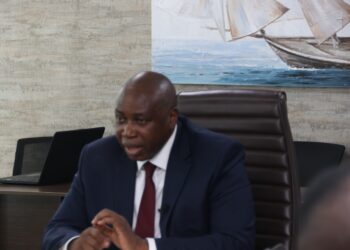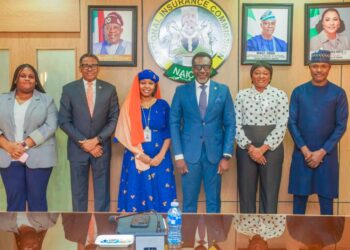The insurance adrenalin is not the sort that generate surges, it happens at intervals that are far spaced from each other. However, when it flows there certain instances where the flow catches some level of attention. That sort of attention was stretched towards the recent Business Journal Annual Lecture 2024 a period in time where insurance stakeholders latched into opportunity to discuss the contribution of insurance business to sustainable economic growth in Nigeria and future of the insurance market in the country.
Mr. Kunle Ahmed, Chairman, Nigerian Insurers Association (NIA), is catching attention not just within the fold of insurers where he is the Chairman of NIA but has gained a high level of reckoning with Loss Adjusters a trade body he refer to as business partners and has deployed the resources of his office in a pattern not seen before to make debtor insurance companies pay Loss Adjusters outstanding fees for claims adjusted and long paid and the adjusters fees thrown into the achieves. He succeeded where over six years old National Insurance Commission circular directing insurance companies to pay had failed. He is willing to go further and discuss a new scale of fees to replace the 33 years old scale. He displays same level of confidence that insurance business in Nigeria will grow if it has the full backing of the law.
Insurance narrative the top insurer postulated, needed change to make make the industry climb over the cliff of restrictions and limitations of different dimensions, and the hunch back that the market needs to stand on as a lift to climb is compulsory insurance. He explained that in most jurisdictions where insurance companies buy banks, its not just the culture of insurance embrace but a latent compulsion that is driven it and failure to be in the flow has its consequences. He noted that the low patronage of insurance has a root in lack of compulsory insurance and the absence of enforcement. The constant picture of this he showed, was low contribution to gross domestic product (GDP).
Ahmed assured attendees at the event that there are insurance reform bills at the National Assembly and he expected those bills to lift insurance over present hurdles, and was confident that a couple of things they want to include in these bills which will at the end ensure that more insurance covers are compulsory, so that Nigerians would adopt insurance as part of their lives.
Group Chairman of NEM Insurance Plc, Mr Tope Smart, who Chaired the lecture, holds strongly that a lot needs to be done to reposition the insurance sector in Nigeria. According him, Nigeria is far behind other countries of the world particularly in Africa in terms of insurance penetration and growth. He highlighted factors inhibiting insurance growth in the country to include lack of consumer trust, low awareness and low income among others.
Another promoter of insurance practice and unfettered obligations to the insured, Ms Adetola Adegbayi, Founder/CEO Mutual Specialists, while burrowing into the theme stated that Nigeria must first face the reality of the fact that it is a poor country before it can ever begin to find ways to come out of that poverty. She also described as incorrect, the tendency to say that Nigeria’s economy ‘defies understanding’ because according to her, “every year, the National Bureau of Statistics (NBS) publishes data of the areas of our economy and how we’re doing, whether we’re doing well or not. You find that we’re heavily concentrated on agriculture and trade.”
She said regrettably that Nigerian insurance industry is yet to get to its pride of place. “On insurance perspectives, in terms of sustainable economic growth as again just like the GDP, you tend to measure performance of the insurance industry from insurance penetration. Penetration doesn’t really help us to measure how insurance is going to grow. Why? Because penetration is just like GDP, it’s looking at absolute, it’s not looking at relatives. What is the absolute? You take the total sum of premium that has been collected by the insurance industry to weigh the revenue of the nation called Nigeria and then compare the revenue with each other. And out of the revenue of Nigeria, the insurance industry contributed .43 percent, the danger is that when you look at it, you will see that Nigeria is not improving in terms of insurance.”
Part of the solutions to reposition the insurance industry, Lolo Idu Okeahialam, former Managing Director/CEO, Access Pension Fund Custodian Limited, who gave a testimony on how an insurance firm helped to replace her car after an accident, however stated that the insurance sector is still under-performing because its services are thinly known to the public and emphasised on the need for massive awareness on television, radio, newspapers, online and social media.
She urged the market to invest heavily in technology, improve accessibility and range of innovative products. “There is need to leverage on innovation and be creative. Do more by focusing on little things for more and above all, invest in cyber securities”, she said.
Dr. Adaobi Nwakuche, Managing Director/CEO, Veritas Kapital Assurance Plc, who highlighted the commendable roles insurance played during the #EndSAS Protest, urged Nigerians to embrace insurance as a risk mitigation mechanism. She noted that there is no good business in the country that does not depend on the financial services sector and insurance should be integrated into this practice. Nwakuche, who was represented by Mr. Godwin Agbonanye, Regional Head for Lagos & South at Veritas Kapital Assurance Plc, noted that given the low penetration level of insurance in the country, practitioners need to collaborate in the space of customer-oriented products.
She urged insurers to invest their premium to ensure adequate support to policyholders in the event of claims. Insurers, she said, should also look in the areas of agriculture, tourism, oil and gas amongst others to grow their businesses.
Feature picture L-R: Mr. Tope Smart, Group Chairman, NEM Insurance Plc and Mr. Kunle Ahmed, Chairman, Nigerian Insurers Association (NIA) at the Business Journal Annual Lecture 2024 in Lagos.









































